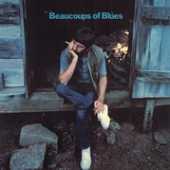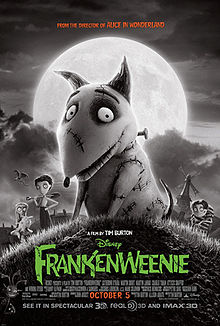Frankenweenie: A bit of a flop for me
I kept hearing that Frankenweenie was Tim Burton’s best movie yet, or at least in years, so I was pretty excited to see it with my seven-year-old. She loves The Nightmare Before Christmas so I figured she would love this one, too. And I just knew I would; I love almost everything that man creates.
This time, however, I was mostly disappointed. The film had such a wonderful start, with so many allusions to classical horror films—the creepy classmates were quite excellent!—and tropes either explored or made fun of (mostly made fun of), but it lacked a certain Burton pizzazz.
You want to be surprised when you watch a Tim Burton movie. You want to really be blown away by the dreamscapes and the imagery, the humor coupled with horror. I found myself giving half-hearted “humphs” every now and then, but I didn’t really laugh. Neither did my husband, a fellow Burton aficionado, which makes me think that I’m not alone here.
The characters were mildly interesting enough, but there were so many lead-ins that resulted in nothing that I got frustrated. So many of the kids—particularly the lead character, Victor, and his neighbor, the “little Dutch girl”—had such promising beginnings. And Burton doesn’t usually make his characters come at you under a full onslaught, I know; he has them gradually creep up on you until you feel like you know them like friends, even without much evidence to support why. I just didn’t get that camaraderie with these characters. They felt way too one-note.
And the parents! I’m not into 50s stereotype moms especially, but when you have clueless moms and dads in a Burton movie, they usually wake up at some point with a huge cathartic moment and see the error of their ways. This did happen in the movie, but it just didn’t feel as moving as it did in many of his other films. I can’t put my finger on it, but something magical was missing.
I did read that some critics had similar reactions to mine. Roger Ebert, for example, said the film was good, but not Burton’s best. And while I am inclined to agree with that, I still wouldn’t call it Oscar-worthy—yet it was nominated for an Academy Award just last weekend (it lost to Brave). And there’s one scene in particular when a beloved pet turned into a creature of death is harpooned with a piece of fallen wood and dies that gave my kid nightmares—which probably would make me dislike any movie, honestly.
Lazy Father Makes Ponytail In 5 Seconds
I am sure this is a clever idea, or a smart time-saver, but all I can see is a lazy father putting his daughters HAIR IN A VACUUM. How does that not hurt? How is that sanitary? I am sure you pick up gross things with that hose, and now you are putting your kid's hair in it? Gross.
More Australia & Winter Miscellany
Cool song. Cool video. Not at all sure what either has to do with Australia, but why quibble?
***
Follow our man Ji-Man Choi's Australian stats here.
He just wrapped up a four-game set at Perth, where he had five hits in 14 ABs, including his 6th home run in just 32 games. He also has 21 walks against 20 strikeouts.
Overall line: .310/.420/.531.
True, Aussieball doesn't mean much of anything, but, considering he didn't play at all in 2011 due to back surgery, we'll take any encouraging signs we can get. And the dingers are good to see on any continent.
***
I meant to put these awesome on-site reports on a main-page article, but haven't yet, so I'll do it now. They are from commenter Tarheel:
Ji-Man in Australia
Two Dogs Skype Each Other
While in reality this is just Gaytory, the wire-haired fox terrier, interacting with a video on YouTube, his reactions are so apt it sure appears the two dogs are conversing in real time. Thanks a lot for this moment, Internet.
"The NFL" - A Bad Lip Reading
The Bad Lip Reading crew sure know how to pick relevant and timely subjects, as in this installment they lampoon the NFL. Enjoy this deciphering of conversations between players and coaches.
Links for January 15, 2013
Japan’s nuclear regulator has announced the need for 50 fallout shelters for residents living near nuclear power plants. simplyinfo.org
The Obama administration is preparing to present a new plan for spent nuclear fuel to Congress that envisions an interim storage site opened by 2025. nuclearstreet.com
Nuclear Weapons and the Gun Debate
There are some interesting parallels between the current debate on guns and the long running debate on nuclear weapons. Both debates revolve around a particular type of weapon and who should have it under what circumstances.
One of the profound things that the nuclear debate has highlighted is the question of when is enough enough. Both the United States and the Soviet Union have thousands of warheads which could destroy the other many times over. Both sides accumulated these weapons out of fear of the other side and their fear ran away from reality. Other countries only have arsenals in the hundreds of warheads but even an exchange of one hundred nuclear bombs could have devastating consequences for the entire world. In a similar fashion, you have people arming themselves past the point of utility. Why would anyone person in our society need 10 guns, 100 guns, 1000 guns? The gun shops will happily sell a hundred assault rifles to one person at one time. This is just plain nuts. Unless he is planning on reselling them, he could not possibility use all of them.
Then there is the question of the sanity of the person who wants the guns. Part of the gun debate is over making sure that people who are mentally ill are not able to purchase a gun. In a similar way, there is a debate over whether some country led by people whose sanity is questioned should be allowed to have nuclear weapons.
Mexico is being flooded with guns smuggled in from the Unites States. Incredible harm is being done to their society with tens of thousands of people being murdered by these smuggled guns. The international community fears that there may be countries, organizations or individuals who would sell nuclear weapons to others who would use them to harm the people of countries that they hate or disagree with about something. Just as law enforcement agencies work to prevent gun thefts, illegal sales and smuggling, national and international agencies are trying to prevent the illegal proliferation of nuclear weapons.
Asymmetry is also an issue. The idea of a small nuclear state such as North Korea attacking a huge nuclear state like the United States would be like a few criminals attacking the New York Police Department. The problem is how to respond with appropriate force to such threats in order to minimize collateral damage to bystanders.
India and Pakistan are neighbors who are not getting along and have been involved in military exchanges in the past like a couple of people who live near each other and have had fights. Both India and Pakistan feel that they need to have nuclear weapons in case the other side uses them. But just like the situation where statistics show that owning a gun to protect yourself is likely to lead to you being harmed, if either India or Pakistan started a nuclear war, they would wind up eating the fallout from their own weapons.
And, finally, part of the problem in both cases is that there are powerful rich organizations and individuals who profit handsomely from the sale of weapons and who apparently have no concern about who might use them and for what purpose.
The human race as individuals and as nations really has to find better ways to resolve disputes than to resort to the use of weapons which may be as harmful to the user as they might be to a target.
The "unfilmable" Cloud Atlas
Its critics, fans and even the author considered Cloud Atlas to be an "unfilmable" novel. But that hasn't stopped them from filming it. This masterpiece of 21st century literature will be released in film form on October 26th, and I for one am curious to see how much of a disaster it will be. I suspect it will be a disaster on some level, if only because early reviews of Tom Hanks' varying accent are somewhat cruel (but it's true, Tom Hanks really can't do accents).
Flaw In The Enigma Code Machine
The Enigma machine might have been one of the finest machines of the pre-computer era. The fine educators over at Numberphile decide to go back to the German machine, this time to discuss its vital flaw that allowed the Allies to break its code in the first place. Fascinating stuff if you consider what might have happened if the Allied forces had not solved this brain-puzzler.
Hawaii could be next to legalize marijuana
I have to admit, when I clicked through this article and learned that Hawaii is showing strong support for marijuana legalization, I snickered. Because of course Hawaii! Right or wrong, our country's 50th state has earned a reputation for being, shall we say, extremely pot-friendly.






As a Sydney-based Mariners fan (and long-time baseball player and coach at decidedly amateur levels), it was fun to see Ji-Man Choi (along with Nathan Melendres - who does not make any grade according to Bat571) play in Sydney tonight for the Adelaide Bite. Ji-Man won player of the week for the Australian Baseball League last week and started this 3 game series against the Sydney Blue Sox with a home run and a triple. I took some video of Ji-Man's hustle double on an opposite-field line drive tonight.
I spoke with Ji-Man after the game quickly (he was nice enough to sign a baseball for my son). I asked him if he was going to get back into catching and he gave me a clear "no". He pointed to his back and said "back surgery". I said, "so, you'll be sticking at first base" and he said "Yes".
For what it is worth, tonight Choi looked really good defensively at first base - made a couple of nice digs and fielded a tricky one that skipped off first base to get the out. All of his at bats were solid. You could see why he is second in the ABL in OPS - he seemed to be in control of every AB, while others on the Bite seemed to struggle with the Blue Sox Pitchers (Ji-Man broke up the combined no-hitter bid in the 7th with his opposite field hustle double).
He was super respectful in talking to fans after the game.
I also talked quickly with Nathan Melendres, who showed off a surprisingly gun arm (by ABL standards) on a perfect throw from center field to third early in the game. I asked him where he thought he would end up in the Mariners' system next year and he though "High A or AA". Melendres was also a nice guy - having a good year here down under – the Mariners could us a surprise solid outfielder in the system…
Anyway - I have been a bit of lurker, but thought some might find this interesting. I can put up video of Choi and Melendres Australian At Bats if anyone is interested.
***
Doyle
On a less prospecty note, Chris Snelling also came out of retirement and played for the Sydeny Blue Sox for the first couple of weeks of the ABL season. In asking Blue Sox people at the game about him, he is "away on other commitments" now but will be back next year with the Blue Sox.
***
I also promised to put up links when my articles started appearing at SeedlingstoStars.com.
The first six are part of a series on "8 Simple Rules" for prospect mining:
Rule 1: Minor league stars might go bust, but minor-league busts don’t become stars.
Rule 2: Age discrimination is not only legal, but mandatory
Rule 3: Watch the all-around, not the individual events
Rule 4: Beware of sluggers with poor plate skills
Rule 5: Hunting for “sleepers”? Try the “Low-K Power Guy” and the “Plate Skills Technician”
Rule 6: Don’t fear the “stall-out year” (under certain circumstances)